
 FAQ 389
Is the Exodus Absolute Biblical
FAQ 389
Is the Exodus Absolute Biblical
Proof for the Creation Calendar?
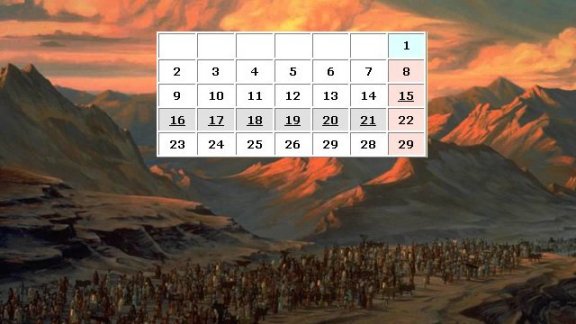


Q. Is there anything in the Scriptures that gives absolute, undeniable absolute proof for the luni-solar Creation Calendar?
A. Yes, plus there's more. We will give over a dozen witnesses in this essay and so make this answer as comprehensive as possible.
Psalm 104:19 says that Yahweh "appointed the moon for seasons (moedim)" (NKJV) which means to "mark" (NLT) or calculate them. This means that the annual festivals, sabbaths and (of course) new moons cannot be known without reference to the moon. Though the sun plays its part (hence 'luni-solar' calendar) for the determination of the beginning and ending of each day, and therefore the counting of days, it is the moon that plays a key rôle in the computation of every divine moed or appointment of the Creator (hence, but also because, all of this was determined at the Creation, the 'Creation Calendar').
1. Exodus Month #1
We will now conclusively show using the precise dates given to us at the time of the Exodus that no other calendar than the Creation Calendar fits the data. We begin with Yahweh's instruction through Moses at the beginning of the New Year:
"This month (Aviv) shall be your beginning of months; it shall be the first month of the year to you" (Ex.12:2, NKJV).
How this is determined is not important for this essay. If you are interested in this you can read the articles on our Rosh Chodesh website. Nor are we interested in this essay in whether a biblical day begins at sunset, sunrise or some other time. If you're interested in that, you can read our Sunrise website.
What's important is that this is Day #1 or Month #1 in the Sacred Calendar. This is called Aviv 1, modern Jews call it Nisan 1, a name borrowed from the Babylonians which they brought back with them from the Exile. The Israelites under Moses were commanded to keep the Passover (Pesach) on Day #14 (Aviv 14), which they did, and Israel was delivered from Egypt on Day #15 (Aviv 15). Numbers 33:3 tells us "the Israelites set out from Rameses on the fifteenth day (Day #15) of the first month, the day after the Passover (Pesach). They marched out boldly in full view of all the Egyptians..." (Num.33:3, NIV), and Deuteronomy 5:12-15 tells us that this day was a Sabbath Day:
"Observe the Sabbath day, to keep it qadosh (holy, set-apart), as Yahweh your Elohim (God) commanded you. Six days you shall labour and do all your work, but the seventh day is the Sabbath of Yahweh your Elohim (God). In it you shall not do any work: you, nor your son, nor your daughter, nor your manservant, nor your maidservant, nor your ox, nor your donkey, nor any of your cattle, nor your stranger who is within your gates, that your manservant and your maidservant may rest as well as you. And remember that you were a slave in the land of Egypt, and that Yahweh your Elohim (God) brought you out from there by a mighty hand and by an outstretched arm; therefore Yahweh your Elohim (God) commanded you to keep the Sabbath day" (Deut.5:12-15, NKJV).
This is one of the Ten Commandments.
In Leviticus 23:6-7 we are given instructions on the Feast of Unleavened Bread (Chag haMatzah) and there we are told that Day #15 in the same first calendar month of Aviv the Sabbath fell on Day #15 too:
"And on the fifteenth day (Day #15) of the same month is the Feast of Unleavened Bread (Chag haMatzah) to Yahweh; seven days you must eat unleavened bread. On the first day you shall have a qadosh (holy, set-apart) convocation; you shall do no customary work on it" (Lev.23:6-7, NKJV).
The day on which "no customary work" is done is the Sabbath day as shown a few verses earlier in verse 3:
"Six days shall work be done, but the seventh day is a Sabbath of solemn rest, a qadosh (holy, set-apart) convocation. You shall do no work on it; it is the Sabbath of Yahweh in all your dwellings" (Lev.23:3, NKJV).
On the month that they left Egypt - Month #1 of the divinely-appointed year and the beginning of the annual calendar - Sabbaths fell on the following days: 8, 15, 22 and 29. The days of Unleavened Bread (Chag haMatzah) fell on days #15-21 as represented in the calendar below:
Month #1 (Aviv) of the Divine Calendar
| |
|
|
|
|
|
1 |
| 2 |
3 |
4 |
5 |
6 |
7 |
8 |
| 9 |
10 |
11 |
12 |
13 |
14 |
15 |
| 16 |
17 |
18 |
19 |
20 |
21 |
22 |
| 23 |
24 |
25 |
26 |
29 |
28 |
29 |
Key: Rosh Chodesh Chag haMatzah Sabbaths
2. Exodus Month #2
We now come to the second month of the Exodus (Month #2) where we learn in Exodus 16:1 that "the whole Israelite community set out from Elim and came to the Desert of Sín, which is between Elim and Sinai, on the fifteenth day (Day #15) of the second month (Month #2) after they had come out of Egypt" (Ex.16:1, NIV). In verse 13 we're told that "that evening quail came and covered the camp, and in the morning (Day #16) there was a layer of dew around the camp" (Ex 16:13, NIV) and when that evapourated, "thin flakes like frost on the ground appeared on the desert floor" (Ex.16:14, NIV) which was their first encounter with Manna. That was Day #16 in Month #2. In verse 22 we're told that on the 6th day of the manna appearing they were to gather twice as much (Day #21 in Month #2) and then we're told in the next verse, "tomorrow (Day #22) is to be a day of rest, a qadosh (holy, set-apart) Sabbath to Yahweh" (Ex.16:23, NIV):
Month #2, Days #15-22 of the Divine Calendar
Key: Quail (#15) & Manna (#16-21) Sabbaths
Do you see the exact same pattern - the same order of days - as the first month? On the same days that the Feast of Unleavened Bread or Chag haMatzah were observed in Month #1 - that is to say, Days #15-21 - food, consisting of Quail appeared on Day #15 and Heavenly Bread or Manna appeared on the ground on Days #16-21 and the Sabbath in both Months #1 and #2, was on Day #22.
This is the first important observation that has to be made: sabbaths have occurred on the same days two months in a row. That is not possible in any calendar other than the Luni-Solar Creation Calendar - it is not possible in a repeating 7-day calendar unless the first month was February. However, neither the Roman 'February' nor leap years existed at this time (about 4,000 years ago) because Rome hadn't even been founded! Moreover, Passover or Pesach never takes place in the Gregorian month of February! So in other words, a Roman-type calendar cannot be the basis of the Exodus story. It's impossible.
3. Exodus Month #3
But let's not stop there - let's examine Month #3 too. If we can show that sabbaths in the third month-in-a-row were on exactly the same days of the month as in the first and second months, then the case is permanently closed against any type of solar calendar such as is used today and firmly establishes the Luni-Solar Creation Calendar beyond any shadow of a doubt.
Exodus 19:1 reads: "In the third month (Month #3) after the children of Israel had gone out of the land of Egypt, on the same day (Month #1, Day #15, the day after Passover/Pesach), they came to the Wilderness of Sinai" (Ex.19:1, NKJV). Do you see how Yahweh has ingeniously ordered this march so as to leave us a clear triple witness?
Let's remind ourselves of the journey from the first month by returing to Numbers 33:3,5-6. Where did the children of Israel stay on Day #15? "The Israelites set out from Rameses on the fifteenth day (Day #15) of the first month (Month #1), the day after the Passover (Pesach)...The Israelites left Rameses and camped at Succoth. They left Succoth and camped at Etham, on the edge of the desert" (Num.33:3,5-6, NIV). So they camped at Succoth on Day #15 and left Succoth on Day #16 where they headed for Etham. Therefore the day they entered the desert or wilderness of Sinai was on Day #16 (Ex.19:1).
Moving on to Exodus 19:10-11 we read: "And Yahweh said to Moses, 'Go to the people and consecrate them today (Day #16) and tomorrow (Day #17). Have them wash their clothes and be ready by the third day (Day #18), because on that day (Day #18) Yahweh will come down on Mount Sinai in the sight of all the people'" (Ex.19:10-11, NIV).
| |
|
|
|
|
|
8 |
| |
|
|
|
|
|
15 |
| 16 |
17 |
18 |
19 |
20 |
21 |
22 |
| |
|
|
|
|
|
29 |
Key: 1st day 3rd day Sabbaths
Thus the Sabbaths are once again established, in the third consecutive month in a row, to be on Days #8, 15, 22 & 29 once again. Thus "by the mouth of two or three witnesses every word shall be established" (2 Cor 13:1, NKJV). Two consecutive months would have established the emet (truth) but we have gone the extra proverbial mile and established it using three consecutive calendar months. That the Sabbaths would fall on the same days for three consecutive months is totally impossible in any Roman or Rabbinical calendar. All examples of Scripture show Sabbaths on the exact same days each month including, as we shall now see, the example of first Messianic Passover period that is often raised by adherents of the Rabbinical calendar, though we shall include a fifth example too to make the case for the Creation Calendar and luni-solar Sabbaths even more watertight.
4. The First Messianic Passover Week
According to the Messianic Scriptures (New Testament), Yah'shua the Messiah (Jesus Christ) was crucified on the evening of Aviv 14
"Now it was the Preparation Day of the Passover (Pesach), and about the sixth hour. And [Pilate] said to the Judeans (Jews), 'Behold your King!' But they cried out, 'Away with Him, away with Him! Crucify Him!' Pilate said to them, 'Shall I crucify your King?' The chief cohenim (priests) answered, 'We have no king but Caesar'" (Jn.19:13-15, NKJV).
The next day was a Sabbath:
"Now when evening had come, because it was the Preparation Day, that is, the day before the Sabbath" (Mk.15:42, NKJV).
Following the Sabbath, on the first day of the week, we read:
"Now after the Sabbath, as the first day of the week began to dawn (notice the day starts at sunrise), Mary Magdalene and the other Mary came to see the tomb...But the malak (angel) answered and said to the women, 'Do not be afraid, for I know that you seek Yah'shua (Jesus) who was crucified. He is not here; for He is risen, as He said. Come, see the place where the Master (Lord) lay'" (Mt.28:1,5-6, NKJV).
We are informed by the Tanakh (Old Testament) that Pesach (Passover) starts on Day #14 and that on the morning (at sunrise) after Pesach (Passover) the children of Israel under the leadership of Joshua ate manna one more time (on Day #15) and that the manna ceased the following morning from Day #16, which was Yom haBikkurim (Day of Firstfruits), the first day of the week:
"So the children of Israel camped in Gilgal, and kept the Passover (Pesach) on the fourteenth day (Day #14) of the month (Month #1) at twilight on the plains of Jericho. And they ate of the produce of the land on the day after the Passover (Pesach), unleavened bread (matzah) and parched grain, on the very same day. Then the manna ceased on the day after they had eaten the produce of the land; and the children of Israel no longer had manna, but they ate the food of the land of Canaan that year" (Josh.5:10-12, NKJV).
Therefore:
- 1. Pesach (Passover) was on Day #14;
- 2. Shabbat (Sabbath) was on Day #15; and
- 3. Yom haBikkurim (Firstfruits) was on Day #16 (first day of the week).
And so we see that Sabbaths were on exactly the same days of the month once again, giving us a fourth witness:
| |
|
|
|
|
|
1 |
| 2 |
3 |
4 |
5 |
6 |
7 |
8 |
| 9 |
10 |
11 |
12 |
13 |
14 |
15 |
| 16 |
17 |
18 |
19 |
20 |
21 |
22 |
| 23 |
24 |
25 |
26 |
27 |
28 |
29 |
Key:
Rosh Chodesh (#1)
Pesach (#14)
1st Sabbath after Pesach (#15)
Yom haBikkurim (#16)
Sabbaths (#8,15,22,29)
Frequently the Rabbinical Calendar followed by Jews and most Messianics today breaks down before the demands of Scripture. One Messianic Jewish Rabbi pointed out this error and commented:
"The true calendar is very user-friendly. The weekdays and Sabbaths of each lunar month always fall on the exact same dates of every month; days of the week do not float through the monthly dates as they do now on the modern calendar. After Hillel II 'fixed' the calendar to fit into a Julian framework and moved the observance of the seventh-day Sabbath from the lunar week to the continuously cycling Julian week, difficulties arose. Sometimes the new moon would appear on Julian days of the week which caused the annual feasts to fall on the wrong days of the new week. As a result, rules of postponement were established – something that was never necessary when the original calendar was in use. None who desire to worship on the true seventh-day Sabbath should look to the Jews for learning when it occurs. All who worship on Saturday because 'the Jews keep Saturday' are following Hillel II’s corruption of the Creator’s calendar and thus breaking His law" (For the whole article, see: Jews Admit! 'The True Calendar Was Set Aside').
5. The last Day of Sukkot
The fifth witness I wish to leave is more by way of an appendix, like the fourth (which I have only added because there are those who claim the Passover events disprove the Creation Calendar - for a fuller treatment of this see, Does Messiah's Death Disprove the Creation Calendar? - the first three evidences establish the Creation Calendar from the Exodus beyond any shadow of a doubt. If you believe later Scripture must be interpreted by what went before it, then further evidence is really superfluous, since it's clear that under Moses the Creation Calendar was followed and Yah'shua (Jesus) has made no subsequent changes (which He would not anyway), hence the two New Testament 'appendices'.
Our final witness comes from the apostle Yochanan's (John's) Gospel and specifically from the time when the Saviour was observing the last day of Sukkot known commonly as the Feast of Tabernacles (Booths). "Now the Judeans' (Jews') Feast of Tabernacles (Sukkot) was at hand" (Jn.7:2, NKJV), at the close of which "Yah'shua (Jesus) went to the Mount of Olives" (John 8:1, NKJV). The Torah, as always, gives precise information about the dates Sukkot (Tabernacles) is to be observed:
"Say to the Israelites: 'On the fifteenth day (Day #15) of the seventh month (Month #7) Yahweh's Feast of Tabernacles (Sukkot) begins, and it lasts for seven days. The first day is a sacred assembly; do no regular work. For seven days present offerings made to Yahweh by fire, and on the eighth day (Day #22 - Shemini Atseret) hold a sacred assembly and present an offering made to Yahweh by fire. It is the closing assembly; do no regular work" (Lev.23:34-36, NIV).
So from this we can construct a calendar for Month #7 that looks like this, building upon what we already know from the first Pesach (Passover) data:
| |
|
|
|
|
|
1 |
| 2 |
3 |
4 |
5 |
6 |
7 |
8 |
| 9 |
10 |
11 |
12 |
13 |
14 |
15 |
| 16 |
17 |
18 |
19 |
20 |
21 |
22 |
| 23 |
24 |
25 |
26 |
29 |
28 |
29 |
Key: Rosh Chodesh (Day #1)
Sukkot (Days #15-21)
Shemini Atseret (Day #22)
Sabbaths (Days #8,15,22,29)
Here we see that Sukkot, which lasts 7 days, begins on Day #15 of Month #7 and ends on Day #21. Celebrants were commanded to tarry an extra day, known as Shemini Atseret ('The last Great Day') or Day #22 of Month #7, and that both this and the first day of Sukkot (Day #15) were Sabbath days.
Yah'shua (Jesus) entered the Temple on Shemini Atseret:
"Now early in the morning He came again into the temple, and all the people came to Him; and He sat down and taught them" (Jn.8:2, NKJV)
After this a lengthy debate ensued:
"Then they took up stones to throw at Him; but Yah'shua (Jesus) hid Himself and went out of the temple, going through the midst of them, and so passed by" (Jn.8:59, NKJV).
Continuing:
"Now as Yah'shua (Jesus) passed by, He saw a man who was blind from birth...Now it was a Sabbath when Yah'shua (Jesus) made the clay and opened his eyes (Jn.9:1,14, NKJV).
So, as in Leviticus, the Sabbath days are on exactly the same days of the month, showing that nothing had changed since the days of Moses as far as the Calendar was concerned:
| |
|
|
|
|
|
1 |
| 2 |
3 |
4 |
5 |
6 |
7 |
8 |
| 9 |
10 |
11 |
12 |
13 |
14 |
15 |
| 16 |
17 |
18 |
19 |
20 |
21 |
22 |
| 23 |
24 |
25 |
26 |
27 |
28 |
29 |
Key:
Rosh Chodesh (Day #1)
First day of Sukkot (Day #15)
Shemini Atseret (Day #22)
Sabbaths (Days #8,15,22,29)
6. Example of Continuity Between Luni-Solar Months
Still not satisfied in spite of the overwhelming evidence, proponents of the Roman and Talmudic systems will object that no examples of sabbaths between the end of one month and the sabbath of a following month, with the required linking Rosh Chodesh or New Moon, can be found. But is this true? No, because the Messianic Scriptures (New Testament) furnishes us with an excellent example:
"But we sailed away from Philippi after the Days of Unleavened Bread (Chag haMatzah), and in five days joined them at Troas, where we stayed seven days. Now on the first day of the week, when the talmidim (disciples) came together to break bread, Paul, ready to depart the next day, spoke to them and continued his message until midnight" (Ac.20:5-7, NKJV).
As we have seen from the Torah, Chag haMatzah or the Feast of Unleavened Bread ends on Aviv 21 (Day #21 of Month #1). Here we are told that Paul fook 5 days to get to Troas (Troy) after the Chag or Feast. He then remained 7 days and the talmidim (disciples) assembled on the first day of the week. If you try to cobble all this together using today's Roman and Rabbinical calendars you end up with a mess. We'll assume a 30-day Gregorian month though the same problem arises for a 31-day Gregorian month (and remember we've established the Pesach or Passover Season never falls in a Gregorian February):
| Sun |
Mon |
Tues |
Wed |
Thurs |
Fri |
Sat |
| |
|
|
|
|
|
1 |
| 2 |
3 |
4 |
5 |
6 |
7 |
8 |
| 9 |
10 |
11 |
12 |
13 |
14 |
15 |
| 16 |
17 |
18 |
19 |
20 |
21 |
22 |
| 23 |
24 |
25 |
26 |
27 |
28 |
29 |
| 30 |
1 |
2 |
3 |
4 |
5 |
6 |
A Gregorian 30-Day Month
Following the Gregorian calendar above, the last day of Chag haMatazah (Unleavened Bread) is on Day #21. 5 days later (22-26) they arrive at Troas and there they remain for 7 days (26-2) and as you can see the 2nd is not the first day of the week (which in the Gregorian calendar would have been Sunday, 30th. Even if you allow for it being a 31-day Gregorian month (remember that in the Bible there are no 31-day long months) [1], that would still not make the first day of the week a Gregorian Sunday.
Now you can play around with the numbers by using other Gregorian set-ups because no two months are ever identical, or only very rarely. You could, theoretically, arrive at a Gregorian calendar that appears to harmonise with the account in Acts 20:5-7 but you will always arrive with one or more days that are disjunctive. In the calendar below we have made the 2nd the first day of the Gregorian week (Sunday). However, that changes all of the Sabbaths (which are no longer the 8th, 15th, 22nd and 29th days of each months) and introduced Aviv 10 as a sabbath which it could never be because it was the day on which the passover lamb was prepared which never fell on a Sabbath (as this was a day requiring work - Ex.12:3ff, etc.), thus contradicting the Rabbinical Saturday system:
| Sun |
Mon |
Tues |
Wed |
Thurs |
Fri |
Sat |
| |
|
|
|
1 |
2 |
3 |
| 4 |
5 |
6 |
7 |
8 |
9 |
10 |
| 11 |
12 |
13 |
14 |
15 |
16 |
17 |
| 18 |
19 |
20 |
21 |
22 |
23 |
24 |
| 25 |
26 |
27 |
28 |
29 |
30 |
1 |
| 2 |
3 |
4 |
5 |
6 |
7 |
8 |
The scriptural data will not fit into either a Roman-
Gregorian or a modern Jewish hybrid calendar
How do we know that Days #8, 15, 22 & 29 were still sabbaths in Yah'shua's (Jesus') day? Because "it was the Preparation Day, that is, the day before the Sabbath (i.e. Day #14)" (Mk.15:42, NKJV). If Day #15 was the Sabbth (as we know it was from John 8 & 9), the 8th, 22nd & 29th were also Sabbaths (8+7=15+7=22+7=29) which in the Talmudic calendar above fall on Thursdays, the 5th day in the Roman week which no one in any tradition is arguing was a 'sabbath'. Furthermore, Day #16 is shown in Scripture to be the first day of the week: "Now after the Sabbath, as the first day of the week began to dawn, Mary Magdalene and the other Mary came to see the tomb..." (Mt.28:1, NKJV). Therefore THE VERSION OF THE CALENDAR SHOWN ABOVE CANNOT BE CORRECT.
7. Fleshy Objections & Evidence of the End-Time Remnant
If, as Scripture testifies, one of the markers of Yahweh's people is observance of the correct Sabbath, and if observing the correct Sabbath (Ex.20:8) and Yahweh's other mandated monthly and annual appointments or moedim can only be done using the luni-solar Creation Calendar, then an evidence or sign of the true Messianic Istaelite Remnant must be faithful observance of the luni-solar Creation Calendar to the very best of ones ability. Observing other 'sabbaths' - Saturdays, Sundays or 'Enochian' Sabbaths - is not observing the Creator's true Sabbath. Though grace is extended to us in the days of our ignorance, once we know the scriptural truth, we are without excuse if we do not respond in proactive emunah (faith). Yet we should not be complacent either but consider that Yahweh causes the "appointed feasts and Sabbaths to be forgotten" amongst His people only in times of apostacy (Lam.2:6, NKJV). Observing the wrong calendar is a sign of apostasy about which we actually need to do something to get right with Elohim (God) again.
"Surely My Sabbaths you shall keep, for it is a sign between Me and you throughout your generations, that you may know that I am Yahweh who sanctifies you" (Ex.31:13, NKJV).
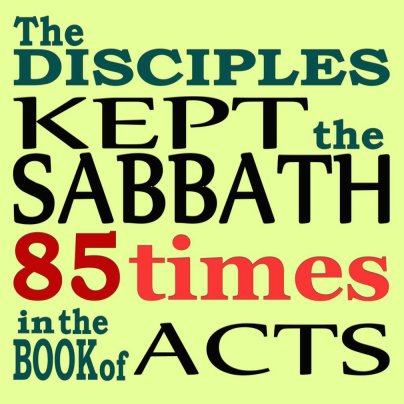
The luni-solar sabbath may be extremely inconvenient in a world that has observed a different cycle for so long which is why I suppose it is one of many tests of discipleship and faithfulness in our day when all emet (truth) is being restored. It certainly forces you, if you are serious about doing what's right, and if you're in earnest about partaking of the "better resurrection" (Heb.11:35) and don't care whether you honour Yahweh fully and inherit a lesser glory or not, to re-order your life completely. Most believers aren't. Why? There can be many reasons, including laziness or indifference, fear of rejection, loss of ministry, the necessity of career change, etc.. So it is a matter of choice. And many, who are 'settled in their ways', are simply reluctant to make waves in their lives or others'.
8. A Typical Luni-Solar Creation Calendar Month
Yahweh is extremely serious about the tavnith (pattern) and way in which we order our time and demands His portion of it in special ways and at the times of His appointment (moed) or choosing each week, month and year because they are special revelations of His heart. (There are also 7-year Sabbatical and 50-year Jubilee appointments). Let's take a closer look at this heaven-appointed Calendar that will help define the end-time Remnant.
| Weekday |
#1 |
#2 |
#3 |
#4 |
#5 |
#6 |
#7
Sabbath |
| Week 1 |
2 |
3 |
4 |
5 |
6 |
7 |
8 |
| Week 2 |
9 |
10 |
11 |
12 |
13 |
14 |
15 |
| Week 3 |
16 |
17 |
18 |
19 |
20 |
21 |
22 |
| Week 4 |
23 |
24 |
25 |
26 |
27 |
28 |
29 |
| (RC pr) | |
|
|
|
|
|
(30) |
| Rosh Ch. |
|
|
|
|
|
|
1 |
A typical luni-solar creation-calendar month - the numbering of
the weekdays and sabbath is always the same and always will be
9. Paul's Troas Visit According to the Creation Calendar
We will now examine Paul's trip to Troas in Acts 20:5-7 and see how it perfectly accords with the Creation Calendar. Chag haMatzah (Feast of Unleavened Bread) ends on Aviv 21 (Day #21), Paul took 5 days to get to Troas (Days #22-26) and stayed there 7 days (Days #26-1, Day #1 being Rosh Chodesh). That brings us to the first day of the week, Day #2, where it is supposed to be. Every other dated event in Scripture is according to Yahweh's Creation Calendar.
| |
|
|
|
|
|
1 |
| Day#1 |
Day#2 |
Day#3 |
Day#4 |
Day#5 |
Day#6 |
Sabbath |
| 2 |
3 |
4 |
5 |
6 |
7 |
8 |
| 9 |
10 |
11 |
12 |
13 |
14 |
15 |
| 16 |
17 |
18 |
19 |
20 |
21 |
22 |
| 23 |
24 |
25 |
26 |
27 |
28 |
29 |
| |
|
|
|
|
|
30 |
| |
|
|
|
|
|
1 |
| 2 |
3 |
4 |
5 |
6 |
7 |
8 |
The seamless Creation Calendar fit of Paul's Troas journey
The question naturally arises, what was Paul doing travelling on the Sabbath, Day #22? To understand how a 'higher law' can sometimes supercede a 'lower law' in Torah, see Keeping the Sabbath Day Holy: Basic Rules for Observing the Weekly Sabbath. About all we know is that Paul was led by the Ruach (Spirit) to go for a specific purpose:
"I came to Troas to preach Messiah's Besorah (Gospel), and a door was opened to me by the Master..." (2 Cor 2:12, NKJV).
From this we deduce the apostle was operating under the direction of the Ruach haQodesh (Holy Spirit) and was therefore acting in obedience (cp. Mk.2:27-28). We know no more than that. Did he pay for his sea passage from Philippi to Troas and break the regular weekly Sabbath that way too? We have no idea how the matter was organised, whether he was given free passage, whether a brother sailed him - we can only speculate, so it is a question best left open-ended. (Personally I do not believe he would have hired someone). Day #21, the last day of Chag haMatzah, is a High Sabbath, so there may also have been a special apostolic ruling that kicked in when a High Sabbath and a regular Sabbath lay back-to-back (the only time in the Creation Calendar year when they do), but if there was, we know nothing about it yet. The only thing we can be certain of is that the Calendar is accurate, it was used for millennia, and the first believers were not willful Sabbath-breakers. See The Double Sabbath Explained for further clarification.
10. The 30th Day
The existence of a 30th day needs explanation. If you check the Dynamic Creation Calendar for your area, you will see that some months have 29 days and some 30. The lunar cycle is no longer a neat 30 days, as once it was in the days of Noah, but now takes ~29½ days owing to cosmic changes over 2,500 years ago [1]. This means that some months have two 'lunar days', an 'extra' one (Day #30) at the end of the calendar month to the one at the beginning (Day #1). It isn't given a name in Scripture and so different groups call it different things. We call it 'Rosh Chodesh Preparation Day' and just serves as a regular day for us. Other ministries treat it as another Rosh Chodesh or New Moon Day and so don't trade on it. Does it have any spiritual significance? Opinion is divided on this matter in the messianic community although we have very definite opinions. See the following articles:
For us, it's absence on certain months is simply a symptom of the imbalance in the cosmic clock caused by a fallen creation. To the Messianic Evangelical mind, the Creation Month in its perfect form nevertheless represents a beautiful divine tavnith (pattern) consisting of four seven-day weeks (representing the Sevenfold Ruach haQodesh/Holy Spirit expressed through the Four Brides of Jacob-Israel - Leah, Rachel, Bilhah and Zilpah - 4 being the number of the material Creation and 7 being the number of completion represented by the Seven Brides of David) protected on both sides by the Father Yahweh or Heavenly Israel (represented by Rosh Chodesh) and Yah'shua (Jesus) the Son or earthly Israel (represented by Rosh Chodesh Preparation Day):
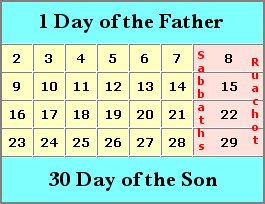 The perfect, restored creation month
The perfect, restored creation month
11. Why the Gregorian Calendar Used by Christians and Messianics is Wrong
The Roman Catholic-created and Judaism-modified Gregorian calendar is a solar calendar that uses only the sun, and not the moon, for establishing divine moedim (appointments). The Biblical luni-solar Creation Calendar (named because it was established at the creation of the world - Genesis 1) uses the moon to determine the beginning of each month and so set the sabbath days and annual festivals. The names of the days are not named after pagen deities (e.g. Thursday = Thor's Day, Saturday = Saturn's Day) but are simply numbered 1-7 (1st to 7th days), with the 7th day being called the Sabbath (Month/Lunar Days #2-29). Similarly, with the exception of the first month (which is called Aviv), the 12 (or 13) months are simply numbered 1-12/13, and are not named after pagan deities, whether Roman (e.g. Janus = January, March = Mars) or Babylonian which Judaism and Messianic Judaism have adoped (e.g. Tammuz for the 4th month - see Ezek.8:14), though there are correspondences with the sons and daughter of Jacob:
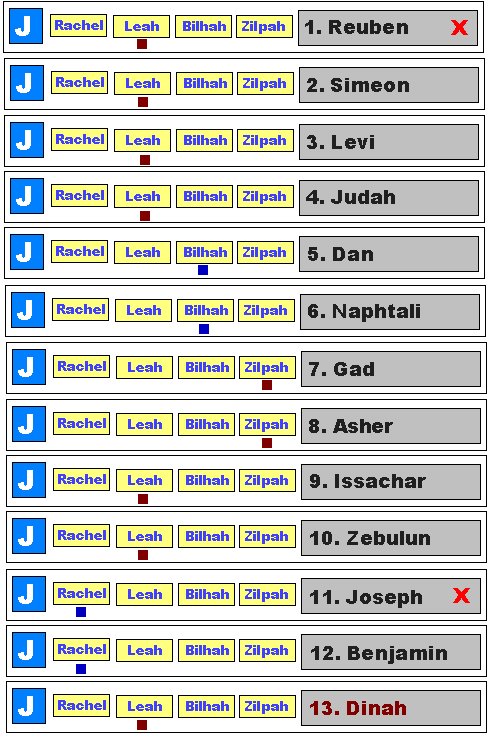
Unlike the Gregorian Calendar, the Creation Calendar requires no man-made 'International Date Line' (IDL) artificially (and irregularly) drawn through the Pacific Ocean, a line that tells us when one day ends and the next day starts. For more information on this, see Festivals Down-Under: Observance in the Southern Hemisphere. In the Creation Calendar, the date line, originally passing through Jerusalem, moves from month to month owing to the irregular 29½ day lunar cycle. Indeed, the beauty and strength of the Creation Calendar is that each month can be easily calculated whether the lunar cycle is in balance (as it once was) or not (as is the case today, hence the 29- or 30-day months). For this reason, the Sabbath day cannot be 'fitted' into the Gregorian Calendar as the days of the week will never agree.
12. Three Types of Days, Not Two
Another major difference between the Gregorian and Creation Calendars is they they each have different types of days. The Gregorian endlessly cycles two types of day: six week days and one sabbath day. By contrast, the Biblical Creation Calendar has three types of day: work days1, sabbath days2 and new moon days3:
"Thus says the Yahweh-Elohim: 'The gateway of the inner court that faces toward the east shall be shut the six working days1; but on the Sabbath [day]2 it shall be opened, and on the day of the New Moon3 it shall be opened" (Ezek.46:1, NKJV).
13. The Battle of Jericho Disproves the Gregorian Calendar
The account of the camp of Israel marching around the pagan fortress of Jericho with the Ark of the Covenant blowing shofars for seven consecutive days, as recalled in Joshua 6, is well known by all. On the seventh day they marched round seven times, shouted loudly, leading to the city being demolished supernaturally and then captured. The question which few ask is: which of the seven days was the Sabbath since the army of Israel was 'working' on all seven of them? The answer has to be 'none of them' and the only time there are seven consecutive days where none is a sabbath day is the first seven days of a new month, the first sabbath falling on the 8th day according to the Creation Calendar. Though not Scripture, the apocryphal Book of Jasher draws the only possible conclusion when it declares:
"And it was in the second month (Month #2), on the first day of the month (Day #1, i.e. Rosh Chodesh), that Yahweh said to Joshua, Rise up, behold, I have given Jericho into your hand with all the inhabitants...And on the seventh day (Day #7) they went round the city seven times, and the cohenim (priests) blew their shofars (trumpets)" (Jasher 88:14,17).
The sabbath, then, was on the eighth day of the month (Day #8), as was well known by whoever authored the Book of Jasher that we have today even though it is almost certainly not the work referenced in the Bible (Josh.10:13; 2 Sam.1:18). But in this matter the author clearly understood the Creatiion Calendar and is historically correct:
| |
|
|
|
|
|
1 |
| 2 |
3 |
4 |
5 |
6 |
7 |
8 |
| 9 |
10 |
11 |
12 |
13 |
14 |
15 |
| 16 |
17 |
18 |
19 |
20 |
21 |
22 |
| 23 |
24 |
25 |
26 |
27 |
28 |
29 |
Month #2, Battle of Jericho, Days #1-7
For a fuller account, see: The Sabbath Day at Jericho:
Important Clues from a Famous Battle
14. First Passover in the Promised Land and Yom haBikkurim
The Book of Joshua corroborates what we by know to be the method by which Israel reckoned her sabbaths and other sacred moedim (appointments). Once again we are told that the nation kept Pesach (Passover), the Sabbath (identified as the first day of Chag haMatzah/Unleavened Bread), and Yom haBikkurim (Day of Firstfruits) on the 14th, 15th, and 16th days, respectively (Josh.5:10-12; cp. Lev.23:3,5-11), maintaining the qadosh (set apart, holy) tavnith (pattern), thus enabling us to confirm and again map precisely, the spring festivals and sabbaths of the Passover Season:
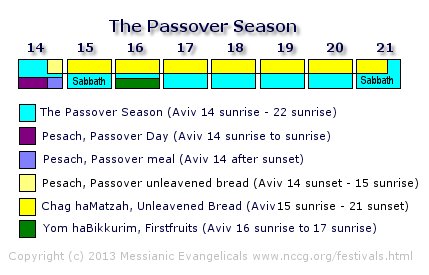
Tabulated in the Creation Calendar with the by now familiar layout:
| |
|
|
|
|
|
1 |
| 2 |
3 |
4 |
5 |
6 |
7 |
8 |
| 9 |
10 |
11 |
12 |
13 |
14 |
15 |
| 16 |
17 |
18 |
19 |
20 |
21 |
22 |
| 23 |
24 |
25 |
26 |
27 |
28 |
29 |
Key: Pesach (Passover), Aviv 14 (Day #14)
Sabbath = 1st day of Chag haMatzah (Day #15)
Yom haBikkurim (Firstfruits) also 2nd day of Chag haMatzah (Day #16)
Once again we see the sabbaths falling on the expected 8th, 15th, 22nd and 29th days of the biblical month.
15. Raising of the Tabernacle & Yahweh's Sabbath Theophany
We come now to our next piece of concrete evidence for the Creation Calendar:
"On the first day of the first month (Aviv 1, Month #1, Day #1) you shall set up the tabernacle of the tent of meeting...Then you shall bring Aaron and his sons to the door of the tabernacle of meeting and wash them with water" (Ex.40:2,12, NKJV)

On Day #8 of that first month (Aviv 1) there was an assembly of the Congregation of Israel, a (7th-day) Sabbath. In the days immediately before that 7th day they were not allowed to leave the Tabernacle:
"And you shall not go outside the door of the tabernacle of meeting for seven days, until the days of your consecration are ended. For seven days he shall consecrate you. As he has done this day, so Yahweh has commanded to do, to make atonement for you. Therefore you shall abide at the door of the tabernacle of meeting day and night for seven days, and keep the charge of Yahweh, so that you may not die; for so I have been commanded" (Lev.8:33-35, NKJV).
The next chapter (Lev.9) tells us that at the end of the 8 days they held a qadosh (holy, set-apart) convocation:
"It came to pass on the eighth day that Moses called Aaron and his sons and the elders of Israel. And he said to Aaron, 'Take for yourself a young bull as a sin offering and a ram as a burnt offering, without blemish, and offer them before Yahweh. And to the children of Israel you shall speak, saying, 'Take a kid of the goats as a sin offering, and a calf and a lamb, both of the first year, without blemish, as a burnt offering, also a bull and a ram as peace offerings, to sacrifice before Yahweh, and a grain offering mixed with oil; for today Yahweh will appear to you''" (Lev.9:1-4, NKJV).
Now we are told what day this 8th day was:
"So they brought what Moses commanded before the tabernacle of meeting. And all the congregation drew near and stood before Yahweh" (Lev.9:5, NKJV).
As we have seen, this was the first month of the biblical year (Aviv) when Pesach (Passover) occurred on Day #14, so Day #15 was the Sabbath Day (as well as being the first day of Chag haMatzah) and Day #16 was the first day of the week (as well as being Yom haBikkurim).
"And it came to pass in the first month (Aviv) of the second year (Y#2), on the first day of the month (Aviv 1, Month #1), that the tabernacle was raised up" (Ex.40:17, NKJV)
Tabulating this data, we arrive at the following:
| |
|
|
|
|
|
1 |
| 2 |
3 |
4 |
5 |
6 |
7 |
8 |
| 9 |
10 |
11 |
12 |
13 |
14 |
15 |
| 16 |
17 |
18 |
19 |
20 |
21 |
22 |
| 23 |
24 |
25 |
26 |
27 |
28 |
29 |
Year #2 in Sinai, Month of Aviv (Month #1)
At Rosh Chodesh ('New Moon Day') in the month of Aviv (Day #1) in the second year of the Sinai wandering, the Tabernacle was erected and for seven days (Days #1-7) the cohenim (priests) had to remain therein and draw close to Yahweh. Day #8 was a Sabbath, when Yahweh appeared before them, and then came Pesach (Passover) on Day #14 followed by another Sabbath (and the first day of Chag haMatzah) on Day #15 followed by Yom haBikkurim on the first day of the week (Day #16).
Once again, we have confirmation that the sabbaths of Israel were on the 8th, 15th, 22nd and 29th days of the month.
16. Dedication of the Temple of Solomon
"At that time Solomon kept the feast seven days, and all Israel with him, a very great assembly from the entrance of Hamath to the Brook of Egypt. And on the eighth day (Day #8) they held a sacred assembly (sabbath), for they observed the dedication of the altar seven days, and the feast seven days. On the twenty-third day (Day #23) of the seventh month (the first day of the week, the day after the High Sabbath, Shemini Atseret) he sent the people away to their tents, joyful and glad of heart for the good that Yahweh had done for David, for Solomon, and for His people Israel. Thus Solomon finished the house of Yahweh and the king's house; and Solomon successfully accomplished all that came into his heart to make in the house of Yahweh and in his own house" (2 Chron.7:8-11, NKJV).
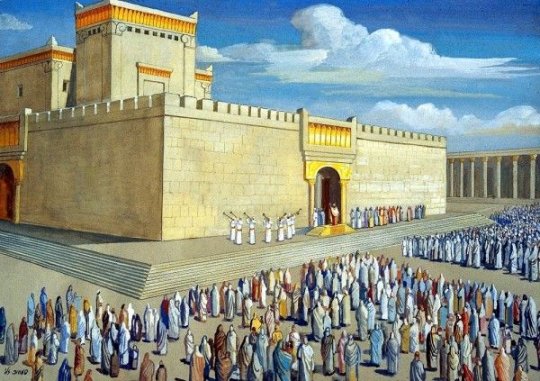
The "feast" referred to here is Sukkot or the Feast of Tabernacles, the last of the annual festivals recorded in Leviticus 23:33-43. Specifically note the dates which give us extra sabbath day markers:
"Also on the fifteenth day (Day #15) of the seventh month (Month #7), when you have gathered in the fruit of the land, you shall keep the Feast of Yahweh (Sukkot/Tabernacles) for seven days; on the first day there shall be a sabbath-rest, and on the eighth day a sabbath-rest" (Lev.23:39, NKJV).
| |
|
|
|
|
|
1 |
| 2 |
3 |
4 |
5 |
6 |
7 |
8 |
| 9 |
10 |
11 |
12 |
13 |
14 |
15 |
| 16 |
17 |
18 |
19 |
20 |
21 |
22 |
| 23 |
24 |
25 |
26 |
27 |
28 |
29 |
Beginning on Day #8, a day of "sacred assembly" (sabbath), seven days of altar dedication proceeded (Days #8-14), to be followed by the seven day-long Sukkot (Feast of Tabernacles) (Days #15-21), of which Day #15 was a sabbath, and concluded by an extra "eighth day" (Day #22) which, like the first day of Sukkot (Day #15), was assigned a "sabbath-rest". Finally, on Day #23 (the first day of the week), those attending the festival were to be sent home.
Once again the fixed sequence of monthly sabbaths on the 8th, 15th, 22nd and 29th days is established.
17. The Sabbath is a Specific Sign Between Yahweh and His People
There are three witnesses in the Scriptures to Sabbath observation being a sign between Yahweh and His people. And as we saw at the beginning of this essay, in the Book of Acts alone we see the talmidim (disciples) keeping the Sabbath no fewer than 85 times:
"And Yahweh spoke to Moses, saying, 'Speak also to the children of Israel, saying: 'Surely My Sabbaths you shall keep, for it is a sign ('ot) between Me and you throughout your generations, that you may know that I am Yahweh who sanctifies you''" (Ex.31:12-13, NKJV).
"Therefore I made them go out of the land of Egypt and brought them into the wilderness. And I gave them My statutes (chuqqim) and showed them My judgments (mishpatim), 'which, if a man does, he shall live by them.' Moreover I also gave them My Sabbaths, to be a sign ('ot) between them and Me, that they might know that I am Yahweh who sanctifies them" (Ezek.20:10-12, NKJV).
"I am the Yahweh your Elohim (God): Walk in My statutes (chuqqim), keep My judgments (mishpatim), and do them; hallow My Sabbaths, and they will be a sign ('ot) between Me and you, that you may know that I am Yahweh your Elohim (God)" (Ezek.20:19-20, NKJV).
Of what specifically is the Sabbath a "sign" or 'ot?
- 1. That the people are sanctified; and
- 2. That they know Yahweh is their Elohim (God).
But what is it specifically provides us with these signs?
"Then Elohim (God) said, 'Let there be lights in the firmament of the heavens to divide the day from the night; and let them be for signs ('ot) and seasons (moedim), and for days and years" (Gen.1:14, NKJV).
It is the lights in the heavens that provide us with these signs. What are these "lights" that are used to calculate the moedim, 'seasons' or 'appointed times'?
"He appointed the moon for seasons (moedim);
The sun knows its going down" (Ps.104:19, NKJV) [2].
The moon determines and synchronises ALL the seasons, divine appointments or moedim into a recurring divine tavnith (pattern), including when the sabbaths are to be observed in each of the months (the four identical days). The sabbaths are always calculated relative to the moon in Yahweh's Divine Calendar. It is the pagans and apostates who have changed the rôle of the moon.
18. Rosh Chodesh is a Day of Assembly Before Yahweh
In Scripture, Rosh Chodesh or 'New Moon Day' is always the first day of every month. Furthermore, every biblical verse that gives information about Rosh Chodesh always speaks of it as a separate day to sabbath days:
"'And it shall come to pass that from one New Moon (chodesh) to another, and from one Sabbath to another, all flesh (all humanity) shall come to worship before Me,'" says Yahweh" (Isa.66:23, NKJV).
What this prophecy is saying is that in the æon or age to come (i.e. the Millennium and beyond), all humanity will assemble and observe the New Moons, Sabbaths, and Feasts of Yahweh, proving, incidentally that Christ did not abolish any of these moedim (appointment). Rather, they are to be extended to the whole world, from pole to pole, as an obligation in perpetuity, just as it had been an obligation - a mitzvah (commandment) - to Israel. If all of humanity is included, then clearlty New Covenant or Messianic Israel (the 'Church') cannot be excluded and was not excluded in New Testament times, nor should it ever have been in the post-apostolic era. If Yahweh never changes, and is the same yesterday, today, and forever, then nobody has the right to 'dispensationalise' these ordinances (in whole or in part) away, as the 'Church' has done. Rather, as Scripture attests, such that do this will receive swift and severe judgment and experience loss of reward in the æon (age) to come. We are commanded to assemble (meet) before Yahweh every Rosh Chodesh and every Sabbath!
That Rosh Chodesh was regarded as a separate day from all others is shown elsewhere too:
"And David said to Jonathan, 'Indeed tomorrow is the New Moon (chodesh), and I should not fail to sit with the king to eat. But let me go, that I may hide in the field until the third day at evening'...Then Jonathan said to David, 'Tomorrow is the New Moon (chodesh); and you will be missed, because your seat will be empty" (1 Sam 20:5,18, NKJV).
Rosh Chodesh was anciently used as a day to consult the nevi'im (prophets), with people often travelling great distances to do so (it was not like a Sabbath which restricted movement). And though the Sabbath was also used for seeking advice from nevi'im (prophets), they did not travel beyond their usual sabbath assembly points. Thus of the Shunammite woman, whose son had died and who wished to urgently speak to the navi (prophet) Elijah on the matter, we read:
"Then she called to her husband, and said, 'Please send me one of the young men and one of the donkeys, that I may run to the man of Elohim (God) and come back.' So he said, 'Why are you going to him today? It is neither the New Moon (chodesh) nor the Sabbath.' And she said, 'It is well.' Then she saddled a donkey, and said to her servant, 'Drive, and go forward; do not slacken the pace for me unless I tell you.' And so she departed, and went to the man of Elohim (God) at Mount Carmel" (2 Ki.4:22-25, NKJV).
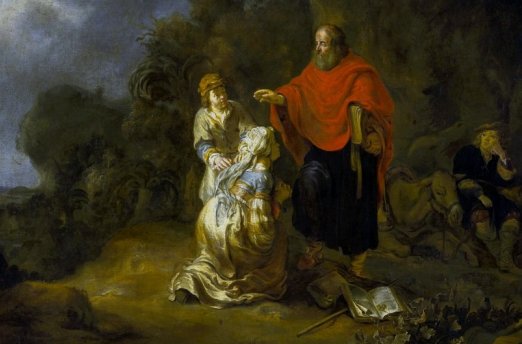 Rosh Chodesh (and to a lesser extent, the Sabbath) were times to
Rosh Chodesh (and to a lesser extent, the Sabbath) were times to
consult the prophets - here the Shunammite woman consults Elijah
Again, Rosh Chodesh is shown to be a distinct day of its own.
"Thus says Yahweh-Elohim: 'The gateway of the inner court [of the temple] that faces toward the east shall be shut the six working days; but on the Sabbath it shall be opened, and on the day of the New Moon (chodesh) it shall be opened" (Ezek.46:1, NKJV).
Rosh Chodesh and the Sabbath, though different types of moed (appointment), are nevertheless both qadosh, holy, or set-apart days to Yahweh that we are not given the right to do whatever we please on. That is why an area of the Temple was open specifically on both these days but not on ordinary work days (1st to 6th days of the week marked off by sabbaths). Because both types of day were sacred and restricted certain kinds of activity (it was not allowed to trade at Rosh Chodesh), they were unpopular with unspiritual and apostate believers:
"Hear this, you who swallow up the needy, and make the poor of the land fail, saying: 'When will the New Moon (chodesh) be past, that we may sell grain? And the Sabbath, that we may trade wheat? Making the ephah small and the shekel large, falsifying the scales by deceit, that we may buy the poor for silver, and the needy for a pair of sandals -- even sell the bad wheat?'" (Amos 8:4-6, NKJV).
The Messianic Scriptures (New Testament) also confirm that Rosh Chodesh was a separate day:
"So let no one judge you in food or in drink, or regarding a[n annual] festival or a new moon or sabbaths" (Col.2:16, NKJV - see article on this verse).
Clearly the New Moon, Rosh Chodesh, was a separate day and event because temple money was set aside for it in the same way as for sabbaths and feasts:
"Also we made ordinances for ourselves, to exact from ourselves yearly one-third of a shekel for the service of the house of our Elohim (God): for the showbread, for the regular grain offering, for the regular burnt offering of the Sabbaths, [and] the New Moons (chodesh), and the set [annual] feasts; for the qadosh (holy, set-apart) things, for the sin offerings to make atonement for Israel, and all the work of the house of our Elohim (God)" (Neh.10:32-33, NKJV).
The first day of each month was set apart as a special day and compared directly with "appointed feasts" (Sabbaths, annual festivals, etc.):
"Also in the day of your gladness, in your appointed feasts (moedim - 'solemn days', KJV), and at the beginning of your months, you shall blow the trumpets over your burnt offerings and over the sacrifices of your peace offerings; and they shall be a memorial for you before your Elohim (God): I am Yahweh your Elohim (God)" (Num 10:10, NKJV).
This is why silver trumpets were blown each Rosh Chodesh, though not over sacrifices because there are no longer any animal or other sacrifices in the New Covenant. But there are still New Months 12 or 13 times a year which we are required to mark or observe in the manner commanded. Rosh Chodesh is the first day of every month. Check your Gregorian and Rabbinical calendars and you will see that a new moon almost never marks the beginning of these unsanctified, pagan-derived 'months', yet they continue to call them 'months' - literally 'moonths'.
"They also kept the Feast of Tabernacles (Sukkot), as it is written, and offered the daily burnt offerings in the number required by ordinance for each day. Afterwards they offered the regular burnt offering, and those for New Moons (chodesh) and for all the appointed feasts (moedim) of Yahweh that were consecrated, and those of everyone who willingly offered a freewill offering to Yahweh" (Ezra 3:4-5, NKJV).
As we saw earlier, and as we have now confirmed multiple times, Yahweh "made the moon to mark the seasons" (Ps.104:19, CJB). Are you marking the seasons by the moon or by some other means?
Thus the first day of each month must be a new moon, the 8th and 22nd (sabbath) days be half-moons, the 15th (sabbath) day be a new moon, and the 29th (sabbath) day be a new moon. In practice the sabbath days will not be exactly half, full or new moons, but close enough, on account of the the irregular lengths of the lunar and solar orbits, an average of 29.53 and 365.256 days, respectively, plus the fact that the earth doesn't rotates around its own axis exactly every 24 hours but every 23 hours, 56 minutes and 4 seconds, good reasons why Yahweh commanded a monthly reset to bring the moedim (appointments) into proper alignment:
| |
|
|
|
|
|
1 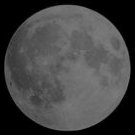 |
| 2 |
3 |
4 |
5 |
6 |
7 |
8 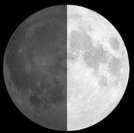 |
| 9 |
10 |
11 |
12 |
13 |
14 |
15 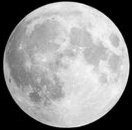 |
| 16 |
17 |
18 |
19 |
20 |
21 |
22 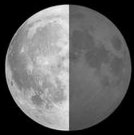 |
| 23 |
24 |
25 |
26 |
27 |
28 |
29  |
Phases of the moon on the monthly moedim
For more on the correct method for determing the beginning of each month, see Rosh Chodesh: Yahweh's Gift of the New Moon.
19. What Scripture Says About the Sabbath
Either because of the very long-established traditions in orthdodox Christianity originating in Rome, or because they just can't be bothered, or because they are unwilling to make the necessary lifestyle adjustments required by Yahweh's Biblical Calendar, believers fool themselves into thinking that it doesn't really matter any longer what day of rest they observe, if any, and are content to make up their own or simply follow what the crowd is doing. For most, then, 'Sunday' or 'Saturday' observance is their preferred choice. However, as we have proven, there is only one sabbath day, on the 8th, 15th, 22nd and 29th days of each Creation Calendar month, so any other 'sabbaths' really aren't sabbaths at all. Occasionally, one of the Gregorian 'Sundays' or 'Saturdays' matches the Creation Calendar, but very seldom.
Most orthodox (Catholic, Eastern and Protestant) Christians have never even heard of Rosh Chodesh and the few that have, ignore it, or (in the case of Messianics) use it improperly on a distorted Gregorian calendar grid which is why they have no idea when Yahweh's sabbaths actually are. All the other 'Sabbatarians', like Messianics and Seventh-Day Adventists, follow the corrupt traditions of the Talmudic Rabbis and dishonour Yahweh by worshipping on the day of Saturn as orthodox Christians do on the 'Saturnalia' or Christmas.
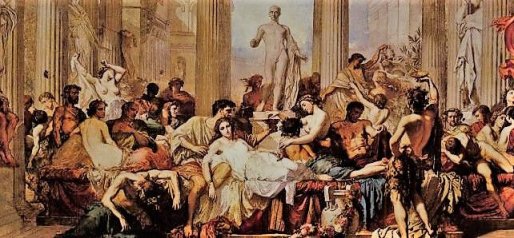 The Saturday 'Sabbath', Christmas and Hanukkah are all tied to the pagan worship
The Saturday 'Sabbath', Christmas and Hanukkah are all tied to the pagan worship
of Saturn - the painting depicts how the Romans celebrated the Saturnalia
Nevertheless, Creation Sabbath observance is commanded throughout Scripture:
"And Yahweh spoke to Moses, saying, 'Speak also to the children of Israel, saying: 'Surely My Sabbaths you shall keep, for it is a sign ('ot) between Me and you throughout your generations, that you may know that I am Yahweh who sanctifies you. You shall keep the Sabbath, therefore, for it is qadosh (holy, set-apart) to you. Everyone who profanes it shall surely be put to death; for whoever does any work on it, that person shall be cut off from among his people. Work shall be done for six days, but the seventh is the Sabbath of rest, qadosh (holy, set-apart) to Yahweh. Whoever does any work on the Sabbath day, he shall surely be put to death. Therefore the children of Israel shall keep the Sabbath, to observe the Sabbath throughout their generations as a perpetual covenant. It is a sign ('ot) between Me and the children of Israel forever; for in six days Yahweh made the heavens and the earth, and on the seventh day He rested and was refreshed'" (Ex.31:12-17, NKJV).
It is, of course, inconceivable that Yahweh would give us a mitzvah (commandment) to keep His Shabbat (Sabbath) days without providing us a way to calculate them. Demanding, as some do, 'a single verse' in proof of the Creation Calendar, though undoubtedly convenient, is not how Yahweh has done it, perhaps because anciently this method of calculation was a 'given'. He has, however, commanded us to establish the truth through multiple (two or three) witnesses [3] and this we have done but with many more...and more could be cited.
But even with compelling evidence such as is given here, people remain confused because they are so used to thinking about time the Roman, rather then the Hebrew, way, and the Bible was not written by Romans but nearly all Hebrews. Satan has gone to a great deal of trouble to prevent man from worshipping the Creator according to the tavnith (pattern) that he demands. Why is this tavnith (pattern) important? Because it reveals the true character if our Heavenly Father that is so different to the many different false caricatures created by man-made traditions with which to discrdit Him and so lead mankind away from emunah (faith) in Him. Even the Scriptures themselves have sometimes become obscured by poor or deliberately biased translations that reflect deniominational positions.
For example, take the King James translation which is fairly typical of Protestant versions:
"And account that the longsuffering of our Lord is salvation; even as our beloved brother Paul also according to the wisdom given unto him hath written unto you; As also in all his epistles, speaking in them of these things; in which are some things hard to be understood, which they that are unlearned and unstable wrest, as they do also the other scriptures, unto their own destruction.
"Ye therefore, beloved, seeing ye know these things before, beware lest ye also, being led away with the error of the wicked (athesmos), fall from your own stedfastness"
(2 Peter 3:15-17, KJV).
There is nothing technically wrong with this translation except when it comes to its rendering of the word athesmos (Strongs G113) which is translated variously - equally poorly - as "unprincipled men" (NASB, RNAB, NEB, JB, JBP, S&G), and "the dissolute" (CLNT) in other translations.
Increasingly, though, modern translations are now getting it correct, namely, those who render athesmos as "LAWLESS" (KNT, NIV, NRSV, ESV, ISRV, Holman, Berkley), "LAWLESS ONES" (OJB), "LAWLESS PEOPLE" (GNB/TEV, NWT2e,), better rendered as "TORAHLESS" (AENT) and "TORAHLESSNESS" (RSTNE2e). Why is "Torahless[ness]" better than "lawless [ones/persons/people]"? Because there are many types of 'law', and Torah identifies it precisely as Yahweh's own Law, the Law found in Scripture. And there is only one kind of 'Law' pertaining to the Sabbath and other divine moedim (appointments) and they are not Roman or Rabbinical/Talmudic.
Typically, the most lawless of believers love to quote a twisted version of Paul who never taught lawlessness, never taught against the Torah, and never overturned or repudiated the moedim (appointments) of our Heavenly Father. He never taught a 'Saturday Sabbath' or a Sunday 'Lord's Day'. Indeed, you will not find these Roman names for the 'sabbath' honouring pagan deities (demons) - 'Day of Saturn', 'Day of the Sun' - anywhere in the Bible. Why would you? The Tanakh (Old Testament) is older than Rome (founded 753 BC, half a millennium after Moses lived), and the Roman calendar has changed multiple times, beginning with an 8-day week which continued to be in use even as late as New Testament times.
Satan has changed the Torah (Law, Teaching) of Yahweh, as you would expect, since he has changed practically everything else that our Heavenly Father ever authored:
"He shall speak pompous words against El Elyon (the Most High = Yahweh), shall persecute the qodeshim (saints, set-apart ones) of El Elyon (the Most High), and shall intend to change [appointed] times (Aram. zeman = Heb. moedim) and law (Aram. dath, 'decrees', 'laws' = Heb. Torah). Then the qodeshim (saints, set-apart ones) shall be given into his hand for a time and times and half a time (3½ years)" (Dan.7:25, NKJV).
"How you are fallen from heaven,
O Lucifer, son of the morning!
How you are cut down to the ground,
You who weakened the nations!
For you have said in your heart:
'I will ascend into heaven,
I will exalt my throne above the stars of Elohim (God);
I will also sit on the mount of the congregation
On the farthest sides of the north;
I will ascend above the heights of the clouds,
I will be like El Elyon (the Most High)'" (Is.14:12-14, NKJV).
The Tanakh (Old Testament), then, is clear about the Sabbath and the other moedim (appointments) like Rosh Chodesh (New Moon Day) and the Annual Feasts and we should not be surprised that there is such confusion in the Body of Messiah about them on account of the activity of Satan. But what do the Messianic Scriptures (New Testament) say? What did the Messiah Himself say?
"Do not think that I came to destroy the Torah (Law) or the Nevi'im (Prophets). I did not come to destroy but to fulfill (complete). For assuredly, I say to you, till heaven and earth pass away, one jot or one tittle will by no means pass from the Torah (Law) till all is fulfilled. Whoever therefore breaks one of the least of these mitzvot (commandments), and teaches men so, shall be called least in the kingdom of heaven; but whoever does and teaches them, he shall be called great in the kingdom of heaven" (Mt.5:17-19, NKJV).
To know whether the Torah is still in force in the New Covenant of Messiah (Christ) you only have to answer these questions:
- 1. Has heaven passed away?
- 2. Has earth passed away?
Clearly not.
If you are teaching that the Torah or Law has been destroyed, nailed to the cross, put aside, or anything like that, then you are teaching that heaven and earth no longer exist, which is a blatant lie. You may have misunderstood Paul, which is not difficult according to the testimony of Peter, but there is no way Christ can be misunderstood. The only way you can claim the Torah has been abolished is if you follow the Moslem principle of 'abrogating' parts of the Quran which contradict other parts by declaring the earlier parts 'null and void'. This means you must do as some very unwise and foolish Christians do by 'abrogating', 'anulling' or 'discarding' everything written before the Cross, or the Resurrection, or some other arbitrarily chosen point in time. But if you do that, you have denied the teachings of the Son of Elohim (God), Yah'shua the Messiah (Jesus Christ), and the Gospel of the Kingdom by putting it in competition against the Gospel of Salvation, in which case you do not understand the Besorah (Gospel) at all! There are even those who reject ALL the Bible except the Book of Acts, and yet others who reject Paul and claim he was anti-Torah! You cannot pick and choose what you want in the Scriptures. IT IS EITHER ALL OR NOTHING! And if you are confused, find a competent Messianic Evangelical to instruct you. Study this website which has been created by revelation and command of Yahweh for the last generation of believers - the Remnant - see Revealing the 900,000 Elect.
Yet another false teaching that is widely believed is that there are two groups of saved people - the Jews (who don't need Yah'shua (Jesus), only the Torah) - and the Gentiles (who don't need the Torah, only Yah'shua (Jesus)), who then say that the Sabbath is only for the 'Jews'. If you are confused about this false teaching, you need to find out who or what 'Israel' is, the chances being that you have been deceived by the Zionism doctrine and the whole 'replacement theology' controversy in which Satan has set up a very clever good cop/bad cop scenario that has resulted in Messianics and Protestants (and other orthodox Christians) warring against one another to no profitable - let alone edifying - end.
What of those who try to make out that Yah'shua (Jesus) Himself was lawless?
"And [Yah'shua/Jesus] said to them, 'The Sabbath was made for man, and not man for the Sabbath. Therefore the Son of Man is also Master (Lord) of the Sabbath" (Mk.2:27-28, NKJV).
Though the context here is a dispute on what is, and what is not, permitted on the Sabbath, nevertheless the fact that Yah'shua the Messiah (Jesus Christ) is "Master (Lord) of the Sabbath", as both its Creator and the Creator of the world, is underscored. If by human fiat you claim to be able to abolish the Sabbath, then with the same swoop of the axe you are cutting away a title and honour of Messiah. You are declaring that He is no longer the Master (Lord) of the Sabbath since it technically no longer exists. Yet, as we have seen, the Sabbath, along with Rosh Chododesh and all the feasts (in a New Covenant setting) will be observed by all mankind in the millennial æon or age to come. The context of this passage is also telling us that the Sabbath is Messiah's perpetual gift to man, and since heaven and earth are still here, so is the Sabbath Day. Indeed, as we saw earlier also, the Sabbath day was kept by the talmidim (disciples) long after He was crucified, the first one being on the day after His death, demonstrating that the Torah was still in effect.
There can be no doubt that the apostle Paul kept the Sabbath continuously whether he was with Gentiles or Jews, as we see in the following passage when he entered a synagogue to preach the Besorah (Gospel):
"But when they departed from Perga, they came to Antioch in Pisidia, and went into the synagogue on the Sabbath day and sat down. And after the reading of the Torah (Law) and the Nevi'im (Prophets), the rulers of the synagogue sent to them..." (Ac.13:14-15, NKJV; see also Ac.13:27; 17:2 for other examples).
Listening to many Protestants and others you get the impression that not only was Sabbath observance no longer required after the Cross but that for some reason became positively harmful to ones salvation. It is not uncommon for such people to falsely accuse sabbath worshippers as 'legalists' trying to 'earn their salvation'...unless they are Jews in which case, for many Protestants, they are already saved and should just carry on being 'legalists'. Yet here was Paul observing the Sabbath and therefore, in the minds of many Christians, a 'legalist'. (It is ironic that there are many Messianics who accuse Paul of being anti-Torah, showing how equally confused they are over Paul's doctrine!) Then there are other Protestants of a liberal mindset who say the first Christians lived both 'Judaism' and 'Christianity' in parallel for some years, some saying they lived both a 'Saturday sabbath' and a 'Sunday Lord's Day'! Indeed, there are one or two very confused believers who do just that, and meet on both days of the Roman Gregorian 'weekend'. Finally, there are the Jehovah's Witnesses who claim the earliest Christians didn't meet on any specific day, that there is no 'Sabbath' or 'Lord's Day' but who meet on Sunday anyway because that's what everyone else does, making it more 'convenient'.
But is it realistic that one (Paul) who was so close to the Saviour was doing something that was no longer required? Then there are other Protestants who claim it didn't matter either way, that Paul and the other apostles just 'behaved' according to the norms of the culture they found themselves in, living one way when with Romans and Greeks, and another when with Jews. To be sure, there is an element of truth to this claim (as when he recommended Timothy be circumcised so that he could witness in Judaism's holy places) and this is partly what causes the confusion.
If the Sabbath had been done away with, you would have expected to find at least one mention in Scripture to that effect. But there isn't. The Elohim (God who) said, "I am Yahweh, I do not change" (Mal.3:6, NKJV), means what He says. What good purpose would abolishing the Sabbath achieve? It is a permanent facet of the lifestyle of Elohim's (God's) people, part of their identity in the One who is the Living Sabbath, who gives us our spiritual shalom (peace) inwardly which we alone can manifest outwardly into our environment through physical and mental rest. The Levitical system with its sacrificial pointers to Messiah has changed, but the Sabbath is pre-Levitical - it is a creation ordinance. The same navi (prophet) who told us that Yahweh is changeless, also went on to tell us about the Great Day of Yahweh's wrath:
"'For behold, the day is coming, burning like an oven, and all the proud, yes, all who do wickedly will be stubble.
And the day which is coming shall burn them up,' says Yahweh of hosts, 'that will leave them neither root nor branch...Remember the Torah (Law) of Moses, My servant, which I commanded him in Horeb for all Israel,
with the statutes (chuqim) and judgments (mishpatim)" (Mal.4:1,4, NKJV)
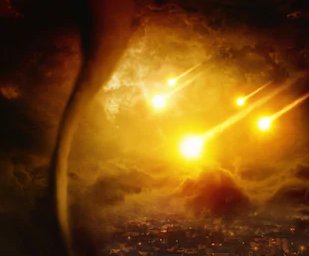 Willful Sabbath disobedience has serious end-time consequences
Willful Sabbath disobedience has serious end-time consequences
We're also told by Malachi what will happen in those days:
"Behold, I will send you Elijah the navi (prophet) before the coming of the great and dreadful day of Yahweh. And he will turn the hearts of the fathers to the children, and the hearts of the children to their fathers, lest I come and strike the earth with a curse" (Mal.4:5-6, NKJV).
As should now be crystal clear, the Biblical Creation Calendar days are not the same as our modern Gregorian Calendar days. They are radically different. The moment you start moving the Gregorian Calendar date line and try to keep the Sabbath day by means of a recurring seven day cycle as the Seventh-Day Adventist (SDA) Church, a 'Saturday Sabbatarian' group, does, then major problems arise as they discovered in Samoa. Because of the ever changing International Date Line (IDL), some SDA churches suddenly discovered they were worshipping on 'Sunday' whereas, previous to the redrawing on the line, they had been worshipping on 'Saturday'. Now had the IDL been drawn through London or New York, or anywhere else, for that matter (which it could have been, since it is man-made), those 'Sabbatarians' who today worship on the 'Day of Saturn' could have found themselves worshipping on the 'Day of the Sun' (not that it makes a lot of difference spiritually-speaking). Indeed, how can anyone know when 'Saturday' or 'Sunday' is using the Gregorian Calendar? The reason the IDL was chosen to run through the central Pacific Ocean, roughly down the 180° meridian, though now it has a lot of kinks in it, was only because the area was sparsely inhabited. Had it been drawn down the Atlantic Ocean, bisecting Greenland, 'Saturday sabbaths' would have been on different days to what they are now:
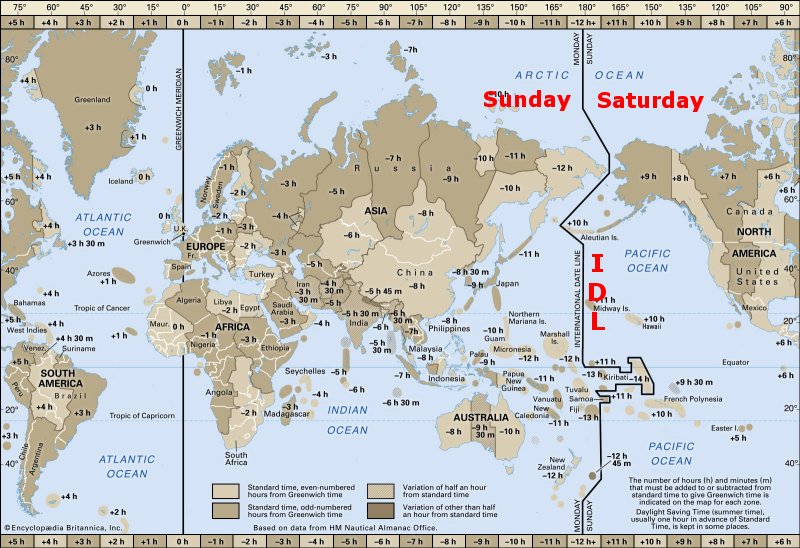 The IDL dividing Saturday from Sunday is man-made and arbitrary
The IDL dividing Saturday from Sunday is man-made and arbitrary
There are historical reasons the IDL appears in the Pacific and that is because the 0° meridian (its mirror opposite) today passes through Greenwich, London. Prior to that there had been meridians through Paris and St.Petersburg and had either of those survived, the 180° line would have been elsewhere...maybe. Who can tell? The IDL is where it is largely because of the British Empire. And so it could be argued that the 'Saturday Sabbath' is largely a British affair, not a Biblical one.
This is the problem that those who use the Gregorian Calendar face - the notion of an IDL is absolutely not biblical. Indeed, an IDL isn't needed using the Creation Calendar because all sabbaths are calculated locally. That is why in the Scriptures there is no equivalent of the Gregorian Year (e.g. 2019 AD) but rather years are reckoned on the basis of the reigns of kings and the ages of individuals. For instance:
"In the twentieth year of Jeroboam king of Israel, Asa became king over Judah. And he reigned forty-one years in Jerusalem" (1 Ki.15:9-10, NKJV).
"Now it came to pass in the fifth year of Jehoiakim the son of Josiah, king of Judah, in the ninth month, that they proclaimed a fast before Yahweh to all the people in Jerusalem..." (Jer 36:9, NKJV).
"So all the days of Enoch were three hundred and sixty-five years..." (Gen.5:23, NKJV).
You will never find a date like '2,564 years since the creation of Adam' or 'of the world'. The very first date we have is, "And Adam lived one hundred and thirty years..." (Gen.5:3, NKJV). But adding the genealogies together is not so easy, leading to discrepancies and disagreements. Archbishop James Ussher in his day (17th century) declared the earth was created on 23 October 4004 BC, the Venerable Bede concluded the creation took place in 3952 BC with Isaac Newton disagreeing slightly and claiming it was 3998 BC. So we don't know, nor, apparently, does Yahweh think we need to know. About the only thing we can be sure about is that, at least from Genesis 1:2, the earth is about 6,000 years old (though how much time there was between Genesis 1:1 and 1:2 is unascertainable and could be a very long time indeed).
So that is why giving a date to Biblical events is notoriously difficult, even though Judaism has attempted to do so. The date we put on our calendars (5943 for late 2019) is a 'guesstimate'. So we really have no idea what year it is. We can only count forwards and backwards from another arbitrarily chosen point, namely 1 AD or CE. To this day there is disagreement as to which year Yah'shua (Jesus) was actually born even if Messianic Evangelicals believe they have calculated the correct one.
What we do absolutely know is that the Bible Calendar uses the Moon for determining the months, festivals and sabbaths. Yahweh very wisely put the sun, moon and stars in the sky where neither man nor Satan could change them. And as we go to great lengths to show in our article, The Book of Jasher and the Sabbath Controversy, all it would take is one single human error in the recording of a continuous cycle of Saturday sabbaths for the entire calendar to be thrown into confusion, never mind any cosmic changes which we know have happened historically. It is therefore utterly impossible for a reliable calendar to have been kept of the kind claimed by Saturday-worshippers. But the Creation Calendar depends on no man (priests, astronmers, etc.) - anyone, anywhere, in any age can go outside, make a simple observation, and know when each month starts, when the sabbaths must then be, and how to calculate the annual moedim (appointments). Yahweh has left nothing to chance or human error.
The date line moves with the moon from one month to the next, so there is no need for an International Date Line (IDL), never remaining in the same place because of the 29.53 day-long lunar cycle. Indeed, this very fact is all the proof needed to demonstrate that the Sabbath using the Gregorian calendar can never be correct and your chances of observing the correct Sabbath in obedience to the mitzvah (commandment) is very, very slim indeed.
To ensure that no error is possible in His Calendar, Yahweh established the constantly moving date line and creates the moedim (appointed times) afresh every month and year using a cosmic clock. These dates can be calculated with the aid of a computer using a Dynamic Calendar such as the one we have created or they can simply be observed with the naked eye the way the ancients did. And having both methods provides an even more solid witness. Learning how to observe takes a little practice but is not difficult and ought to be the responsibility of the head of each family (or designated person) and local assembly (or designated person) to ensure multiple witnesses. Our website will show you how to do this.
So which Calendar will you use: Yahweh's or Caesar's? (Mk.12:17) The restoration of the Divine Calendar in these last days is part of the end-time "restoration of all things, which Elohim (God) has spoken by the mouth of all His qadosh (holy, set-apart) nevi'im (prophets) since the world began" (Ac.3:21, NKJV).
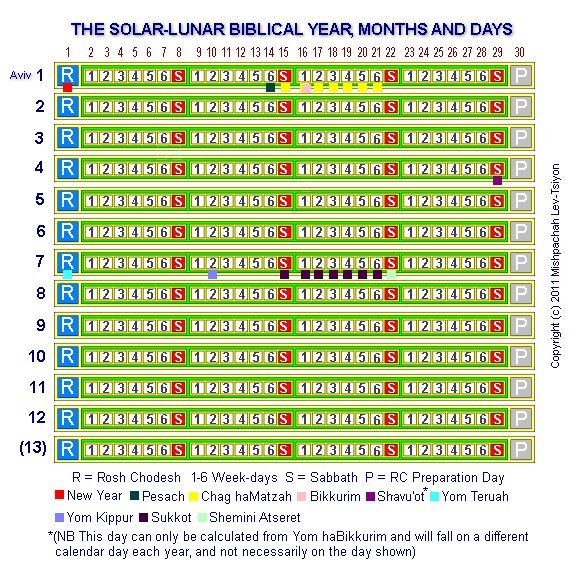
My job - the job of the penultimate generation - is to prepare the final generation in the same way that David prepared the building materials for Solomon to build the Temple at Jerusalem. Ours is a temple of spiritual knowledge and understanding, the essential tools and guideropes for the final Exoduseers. Messianic Israel will be on the move in the final generation and the Creation Calendar will be part of its equipment. We are rebuilding what was lost that it may again be found:
"Those from among you
Shall build the old waste places;
You shall raise up the foundations of many generations;
And you shall be called the Repairer of the Breach,
The Restorer of Streets to Dwell In" (Is.58:12, NKJV).
What shall be restored is revealed in the next verse:
"If you turn away your foot from the Sabbath,
From doing your pleasure on My qadosh (holy, set-apart) day,
And call the Sabbath a delight,
The qadosh (holy, set-apart) day of Yahweh honourable,
And shall honour Him, not doing your own ways,
Nor finding your own pleasure,
Nor speaking your own words,
Then you shall delight yourself in Yahweh;
And I will cause you to ride on the high hills of the earth,
And feed you with the heritage of Jacob your father.
The mouth of Yahweh has spoken" (Is.58:13-14, NKJV).
If observing the correct Sabbath is so important to Yahweh then it had better become important to you too, don't you think? The choice is yours:
"For the time will come when they will not endure sound doctrine, but according to their own desires, because they have itching ears, they will heap up for themselves teachers; and they will turn their ears away from the emet (truth), and be turned aside to fables. But you be watchful in all things..." (2 Tim.4:3-5a, NKJV).
Will you now not only seek Sabbath truth diligently in Scripture but do it properly too?
Continued in Part 2,
Does Messiah's Death Disprove the Creation Calendar?
Endnotes
[1] 30-day Gregorian months are April, June, September and November; 31-day Gregorian months are January, March, May, July, August, October and December. The Gregorian second month of February has 28 or 29 days, depending whether it's a leap year. The Luni-Solar or Creation month has either 29 or 30 days, depending on how the moon resets each month, with an extra 13th month every few years to align the seasons. This is on account of some kind of cosmic perturbation which occurred in 705 BC which resulted in two sunrises and sunsets in a 24 hour period. At this time the length of the year lengthened from 360 to 365 days:
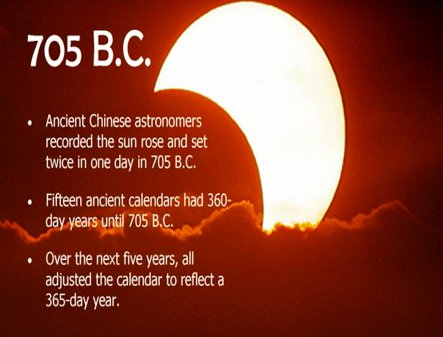
See the articles on the Creation Calendar website for further explanations.
[2] Some translations are very naughty: "He assigned the moon to mark the months, and the sun to mark the days" (The Living Bible paraphrase), assuming that "the sun knows when to set" (ATOT) has something to do with the marking of day's end and day's beginning as taught by the Rabbis - see the Sunrise website). One of the better translations reads: "Thou hast made the moon to measure the year and taught the sun where to set" (NEB) although even this strictures the word moedim which means all the divine appointments
[3] Deuteronomy 17:6; 19:15; Matthew 18:16; 2 Corinthians 13:1; 1 Timothy 5:19; Hebrews 10:28
Acknowledgements
[1] The Calendar of Scripture (not all the materials on this website are acknowledged by NCAY as being accurate)
Comments from Readers
[1] "I will admit the possibility that this is how the deepest believers are sealed on their foreheads. Perhaps those who give up their jobs and security and relationships and all the support of this world for even this one thing that our Adonai says is important...Perhaps THEY are the ones who are spared from the wrath of YHWH in the Last Days. Maybe they are the ones who are called out into the Second/Greater Exodus to meet Yeshua at Mount Olivet" (JS, USA, 16 December 2019)
[2] "I'm probably more than 1/3 into the article. Thank you, is such a pitiful gratuity. Like most 'church folks', it is very difficult to understand scripture and connect all the dots, using the bogus Gregorian Calendar. The Rabbinical Calendar improves focus but there is still a blur. Your essay sharpens the focus and pieces the needed information together to make it all make sense. Small wonder that most of churchanity is the blind leading the blind. It is worse that I had imagined. I will post the link on my page. I will make your page, nccg.org a regular place of study. For me, your work has been overwhelming for me for some time. And like most, we tend to have an adverse reaction to new information, especially when it exposes deceptions about the TRUTH of HIS kingdom and beyond. So we will be chatting from time to time. You are an amazing creature, Brother. You have an incredible mind and intellect to be able to learn all of these things in your life time, scribe them, and make them all available for us. I'm sure your frustrations at man's unwillingness to search the scriptures daily to see if these things be so, is quite frustrating, considering all of your efforts to teach us, a people who are quite reluctant to learn anything new. So again, thank you. We will be in touch, I am sure. All HIS best to you and yours. Enjoy the Spring time and the warm up, once again" (LS, 14 April 2023)


This page was created on 15 December 2019
Last updated on 14 April 2023
Copyright © 1987-2023 NCAY - All Rights Reserved




